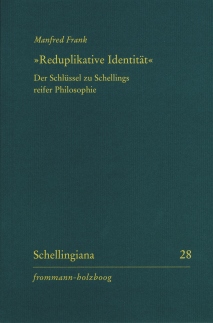Manfred Frank: »Reduplikative Identität«
Der Schlüssel zu Schellings reifer Philosophie.
Links / Downloads
Keywords
It was not until the publication of Schelling’s Munich and Berlin lectures that we learned the decisive source for his theory of an »identity of identity« or »identity doubled in itself.« Schelling referred to what he called an »older logic that was still acquainted with the figure of reduplication«, for instance in Leibniz and Wolff. Philosophers in this tradition employed this term to refer to the specification of an aspect under which the subject-term is being considered. An often quoted example: »As consul, Fabius Maximus has authority over his father, but as son he stands under his father’s authority.« Schelling gave the following turn to ›reduplication‹: Nature as nature does not coincide with the mind; and the mind as mind does not coincide with nature. Both have different truth conditions, so as to »integrate« an essential moment of difference into the identity formula. There is an X, however, which is strictly (»seamlessly«) identical with itself (the absolute subject = X) while »transitively being« both of them in turn; and it is only via X that the relata (nature and mind) are indirectly identified with each other: ›X is B‹ and ›X is A‹ (and ›X is strictly identical to itself‹).
In addition to this, Schelling held a view of predication as kind of identification. He became acquainted with this view at the Tübingen Seminary through his teacher Gottfried Ploucquet. This insight helps us understand why Schelling reasonably thought that the identity-formula ›A=A‹ is the genuine ›matrix‹ of all veridical judgments. Taken together with his conviction that judging (Kant’s ›relative position‹) is a ›minor‹ (or ›inferior‹) form of existential being (Kant’s ›absolute position‹) sheds light on why in 1806 Schelling made the radical contention in his Aphorisms: »The strict sense of being (absolutely posited seamless self-sameness) is taken over by the looser sense of the copulative ›is‹ which identifies subject and predicate; yes, this copula alone is existence itself and nothing else.«
Why should Schelling’s conception of nature-mind identity interest recent philosophers of mind? Because Schelling presents an ontologically neutral solution: Identity is a symmetrical relation that does not favor mind or matter, and prevents the ›idealistic‹ reduction of nature to the mind. Nor can we conceive of the nature-mind identity as a fact inwardly disclosed to the mind (McGinn, Levine). Consciousness remains an enigma for itself; so does its identity with nature. Schelling teaches us that identity theories are not justified by self-evidence, but by an inference to the best explanation.
All volumes
- Schellings Berliner Vorlesungen über Philosophie der Offenbarung – February 2026
- Schmidt: Schellings Zeittheorie – available
- Freedom and Creation in Schelling – available
- Das Unendliche endlich dargestellt – available
- Schelling: Theologische Jugendschriften – available
- Scheerlinck: Gedanken über die Religion – available
- Schelling: Denkmal von den göttlichen Dingen – in preparation
- Arnold: Schellings frühe Paulus-Deutung – available
- Frank: "Reduplikative Identität" – available
- Schelling in Würzburg – available
- Tilliette: Untersuchungen über die intellektuelle Anschauung von Kant bis Hegel – available
- »Die bessere Richtung der Wissenschaften« – available
- Friedrich: Der Ungrund der Freiheit im Denken von Böhme, Schelling und Heidegger – available
- Schopenhauer liest Schelling – available
- Heideggers Schelling-Seminar (1927/28) – available
- Ziche / Rezvykh: Sygkepleriazein – Schelling und die Kepler-Rezeption im 19. Jahrhundert – available
- Schelling: Vorlesungen über Philosophie – not to be published
- Schellings Bibliothek – available
- Philosophie und Gestalt der Europäischen Universität – available
- Naturphilosophie nach Schelling – available
- System – Freiheit – Geschichte – available
- Gloyna: Kosmos und System – available
- Schellings philosophische Anthropologie – available
- Schelling: Weltalter-Fragmente – available
- Bach: Biologie und Philosophie bei C. F. Kielmeyer und F. W. J. Schelling – available
- Das antike Denken in der Philosophie Schellings – available
- Die Realität des Wissens und das wirkliche Dasein – available
- Danz: Die philosophische Christologie F. W. J. Schellings – available
- Schmied-Kowarzik: ›Von der wirklichen, von der seyenden Natur‹ – available
- Rudolphi: Produktion und Konstruktion – available
- Schelling: Philosophie der Mythologie – available
- Schellings Weg zur Freiheitsschrift. Legende und Wirklichkeit – available
- Schelling: Timaeus (1794) – available
- Philosophie der Subjektivität? Teil 2 – available
- Philosophie der Subjektivität? Teil 1 – available
- Ehrhardt: Schelling Leonbergensis und Maximilian II. von Bayern – available
- Schelling: Einleitung in die Philosophie – available
- Subject Areas
- New Publications
- ---
- Critical Editions
- Collected Works
- Series
- Arbeiten und Editionen zur Mittleren Deutschen Literatur
- Aufklärung und Revolution
- Böhme-Forschungen
- Bibliothek 1800
- Clavis Pansophiae
- Collegium Philosophicum
- Commentaria in Aristotelem Graeca
- Doctrina et Pietas
- Editionen zur Frühen Neuzeit
- Elea
- Europäische Literatur der Frühen Neuzeit
- exempla aesthetica
- Forschungen und Materialien zur Universitätsgeschichte
- Forschungen und Materialien zur deutschen Aufklärung
- Freidenker der europäischen Aufklärung
- Freud heute
- frommann-holzboog Studientexte
- Fundamenta Historica
- Grammatica Speculativa
- Grammatica Universalis
- Kultur und Gesellschaft
- legenda
- Judith Le Soldat heute
- Medizin und Philosophie
- Melanchthon-Schriften der Stadt Bretten
- Mystik in Geschichte und Gegenwart
- Natur und Philosophie
- Neuzeit im Aufbau
- Philosophie interkulturell
- Philosophische Clandestina der deutschen Aufklärung
- Der Platonismus in der Antike
- Politische Philosophie und Rechtstheorie des Mittelalters und der Neuzeit
- problemata
- Psychoanalysis International
- Quaestiones
- Schellingiana
- Specula
- Spekulation und Erfahrung
- Supplementum Platonicum
- Volksaufklärung
- Werkstatt Bionik und Evolutionstechnik
- Bibliographies and Reference Books
- Allgemeine Zeitschrift für Philosophie
- AZP Beihefte
- Jahrbuch der Psychoanalyse
- JP Beihefte
- Steiner Studies
- Open-Access
- Single volumes
- eBooks
- Special Offers
- ---
- Authors
- Publishing house
- Links / Partner
- Paths to Philosophy
